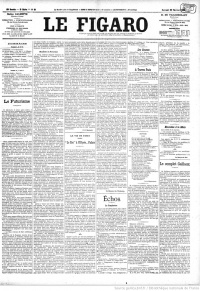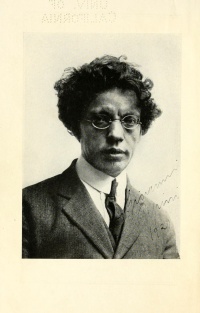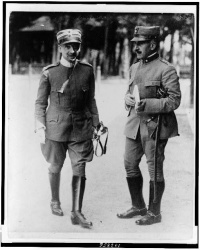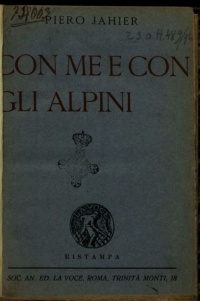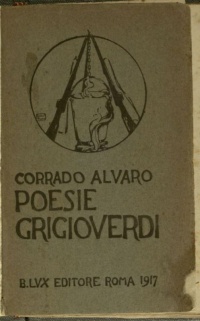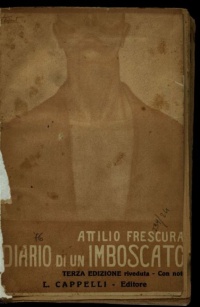Introduction↑
This article dwells on Italian literary production during the Great War, taking into account its different forms: from the autobiographical account to the conventional novel, from the lyric to the narrative poem, from journals to memoirs. We are concerned here with a legacy of texts of greatly varying aesthetic value and in the most diverse genres which, aside from narrative and lyric, include oratory, essays, correspondence, ethical treatises, reflections, journalism, plays and yet other literary forms. Considered as a whole and taking into account their different provenances and values, they gave rise to a corpus of works that has still to be ordered and understood. In some cases – I have in mind the numerous letters written by combatants to their families and friends – such writings were savagely cut by the military censor. Subsequently fascism likewise inflected the voices of all those who sought to acquaint a public ever more used to a mythicised and mythicising image of the war with all the horrors and injustices that had marked the conflict. Again, for certain others – I have in mind here the Austro-Italian combatants who had served in the Habsburg army - their testimony was destined to be confined to their immediate family circle, involving as it did a memory that scarcely chimed with the notion of “unredeemed” lands in which one and all were presumed to aspire to rejoin the motherland. Finally, still others preferred to remain silent and to forget the horrors they had experienced, doing no more than refer glancingly to just a small part of that memory and only recalling the most every day, humdrum and “normal” aspects of their war experience. All the same, among the many elements that helped to render the Great War unique and turned it into an authentic watershed in contemporary history, it is undoubtedly worth singling out the extraordinary abundance of literary testimonies, published in part when the conflict was still under way, and in part – at any rate in the Italian context – in the post-war period, although at intervals, for over fifteen years or so.
Intellectuals and the Great War↑
For many young intellectuals the Great War constituted the first test or trial of their creative powers, for some of them a chance to reflect and to experiment, while for others it was their sole opportunity to fashion a work that can unequivocally be defined as “literary”.[1] It is in no way far-fetched to claim that the first mass war in history engendered a mass memory of the event, on condition that we include “occasional” writings and the literary production of the popular classes, a mass of texts constituting in its totality an authentic epic of modernity that inaugurated the era of mass testimony.[2]
It was thus an exceptional response to an exceptional event, in anticipation of which many Italian intellectuals had already mobilised in order to reflect upon the meaning of a possible conflict and, sometimes, to invoke it. This was true of Filippo Tommaso Marinetti (1876-1944), who was already singing the praises of war in the 1909 Manifesto del futurismo (“The Futurist Manifesto”)[3]; of Giovanni Papini (1881-1956), who was prepared, in 1914, to exalt a “hot bath of black blood” (caldo bagno di sangue nero)[4]; and of Gabriele D’Annunzio (1863-1938), the theoretician of a society that was aristocratic and despised democracy, and the bard of Italian colonial adventures.[5]
These were in any case the golden years of the so-called “party of intellectuals”,[6] which had expressed itself fully on the pages of the early 20th century “Florentine” reviews, only to rally, though with different emphases, around the interventionist cause that exploded in Italy during the period of its neutrality.
For some of these intellectuals, stricken by a sense of isolation and crisis due to losing their way as a mass society was constituted, the war gave them an opportunity to feel at long last an integral part of an entity such as the nation-in-arms or the people-soldier. In his 1914 Discorsi militari (“Military Speeches”) the Ligurian Giovanni Boine (1887-1917) thus set about drafting a set of ideal rules and regulations for an army. Renato Serra (1884-1915), an acute critic and contributor to the Florentine review “La Voce”, was concerned not so much to identify the road to a radical overturning of society glimpsed in the depths of the imminent conflict by futurists and revolutionary socialists, as to grasp through it the possibility of adhering to a common movement, in order to escape from his own ivory tower.
The Triestine volunteer Scipio Slataper (1888-1915) cherished the same illusion, as did Serra, who fell at the front in 1915, one of the most important representatives of Triestine literature[8] and of the world of “La Voce” – with which Boine was likewise aligned – and, with still other emphases, so too did another Vocian, Piero Jahier (1884-1966), the author of Con me e con gli alpini (1919), a work that sustained the myth of the Alpine soldier but also the form of populism that for many years was destined to accompany it.[9]
Lyric Poetry↑
An important place in Italian war literature was indubitably occupied by lyric poetry, which oscillated between two extremes, though the very broad middle ground did in the end prevail. On the one hand there was the highly refined and elaborate poetic expression of authors aligned with the avant-garde – it was anyway the heyday of the artistic and literary avant-gardes – as in, for example, the work of Giuseppe Ungaretti (1888-1970). On the other hand there were countless poetic texts belonging to a hackneyed rhetorical tradition and written simply to celebrate victory or the victors.
Then, if you consider, for example, the 1918 verses of Vittorio Locchi’s (1889-1917) La sagra di Santa Gorizia ("The Feast of Santa Gorizia"), there was a vast middle ground occupied by those whose attempts to immortalise the conflict adopted a tone wavering between rhetoric and the search for a mode of expression more adequate to the absolute novelty of the event.[10] Certainly, alongside the Ungarettian collection bearing the title Il porto sepolto (“The Buried Harbour”), which was published in a very limited edition in 1916 and was the fruit of the author’s own experience as a soldier on the Carso,[11] we should at least recall the lyric poems Poesie sparse e prose liriche (“Scattered poems and Poetic prose”, 1913-1927) by Clemente Rebora (1885-1957); the 1917 Poesie grigioverdi (“Grey-green Poems”) by Corrado Alvaro (1895-1956), the author also of one of the most significant war novels in an autobiographical vein, namely Vent’anni (“Twenty years old”, 1930), and not forgetting the original contribution of the Triestine Giulio Camber Barni (1891-1941). A volunteer with irredentist convictions and the author of the 1935 collection La buffa (“The Squaddie”), Barni in fact managed to recount the stories of victors and vanquished, infantrymen and volunteers, in a tone wholly devoid of the kind of rhetoric that would come to connote the Italian post-war period, so much so that he felt obliged to expunge from one of his own collections a lyric dedicated to the “bersagliere” Benito Mussolini (1883-1945). He was flanked by another Triestine, Umberto Saba (1883-1957), author of the Poesie scritte durante la guerra (“Poems written during the war”),[12] which, in the style characteristic of this writer’s subtle poetic investigations, are dedicated to a humanity overwhelmed by the conflict.
Narrative↑
In the field of war narrative, subdivided as it is into a great variety of genres, there were numerous novels, a good proportion of them being virtually the sole fruit of individual authors who wrote only of their own wartime experience. Such authors were either concerned to bear witness to the drama or adventure through which they had lived – more or less in harmony as the case may be with the post-war mood, when fascism in fact took control of, and largely moulded the memory of the conflict and the modalities of its representation – or else to rework in some way the terrifying experiences they had endured. I am thinking here, first of all, of Trincee. Confidenze di un fante (“Trenches. Secrets of an infantryman”, 1924),[13] by Carlo Salsa (1893-1962), a man by no means averse to compromises with fascism, but capable all the same of creating a work that must rank as one of the most emblematic Italian narratives of the war. Adopting a lean, dry style, Salsa described with unrivalled power the atrocious nature of the conflict, the experience of mass death and of the grotesque entwining of life with death that had characterised it, and the horrors of the frontline, but also stories of friendship and deeds of courage arising from the solidarity between fellow soldiers.
An equally harsh tone characterises the 1934 volume by Alfredo Graziani (1892-1950), Fanterie sarde all’ombra del tricolore (“Sardinian Infantrymen in the Shadow of the Tricolor”), which likewise does not spare its readers when describing the horrors suffered by, and the valiant deeds of the Sassari Brigade, one of the crack units in the Italian army, deployed at every hotspot, from the series of assaults upon San Michele sul Carso, and upon the Asiago plateau before and after the so-called Strafexpedition as far as the Piave. Mention of the Sassari Brigade necessarily calls to mind the work of Emilio Lussu (1890-1975), a politician who also made a real and enduring contribution to literature. Lussu was the author of a 1938 book, Un anno sull’altipiano (“A Soldier on the Southern Front”), which in Italy only saw the light of day at the end of the Second World War, on account of its scathing account, above all of the upper echelons of the army, and of the absurd ways in which his men – Lussu was in fact a combatant, a young officer who abided by his own democratic credo and performed numerous courageous acts – were forced to confront the enemy.[14]
Pages by an author such as Curzio Malaparte (1898-1957) give a truly abrasive account of the conduct of the war. By contrast with Lussu, who was persecuted by the regime, Malaparte had compromised to a great extent with fascism and yet in 1921 wrote a text very much against the tide, Viva Caporetto! La rivolta dei santi maledetti (“Viva Caporetto! The revolt of the accursed Saints”). So much at odds was Malaparte’s book with the prevailing mood that it was both subjected to fascist attacks and confiscated by the ministers of liberal Italy. The work even went so far as to touch the most painful node in the national memory, and one that victory, patriotic rites and a political climate on the verge of an authoritarian turn would wish to see wholly erased, namely, Caporetto, an episode which to Malaparte had the value of a “revolt of one class, of one mentality, of one frame of mind, against another class, another mentality and another frame of mind.”[15] This was the myth of the footsoldier, counterposed to the bourgeois nation, which in time of war had not even managed to rally round its own squaddies.[16]
There is likewise a critical tone, though a softer one, to the autobiographical memoirs of the Triestine volunteer Giani Stuparich (1891-1961), the author of a diary entitled Guerra del ’15. Dal taccuino di un volontario (“The war of '15. From a volunteer's notebook”, 1931).[17] This text, which in its turn met with a hostile reception from the regime, dwelt upon the early months of Italy’s war on the Carso, upon the disillusionment of those who, like Stuparich himself, had called for intervention and had offered themselves as volunteers, and yet all the same were not spared the hostile treatment meted out to the soldiers, not to mention the suspicions directed at he and his brother Carlo by virtue of their being Austro-Italians. Stuparich, who was awarded the gold medal for military valour, also wrote a novel with a narrative structure that was 19th century in inspiration, entitled Ritorneranno ("They shall return", 1941). In his interpretation of what he had gone through, the author, while not reneging upon the ideals that had originally inspired him, highlighted not only the horrors of that war in particular but even went so far as to radically question every conflict, thus earning harsh criticisms from his detractors, some of them inspired by anti-Semitism (his mother in fact being Jewish in origin). Mention should also be made here of Carlo Pastorino (1887-1961), an author akin to Stuparich both in tone and in motivation. Pastorino was a singer not only of the travails of war (La prova del fuoco, “Trial by Fire”, 1926) but also of the dismal and dramatic experience of prison (La prova della fame, “Trial by Hunger”, 1926), a symbol of the collapse of the hopes that had in fact sustained him. When faced with the realities of the conflict, and comparing it with the tales recounted in his family by those who had participated in the wars of the past, he spoke as follows: “Military manoeuvres were thus not children’s games but truly terrible things; and I felt remorse at having nurtured within myself for years and years that obscure desire. In all humility I asked God to forgive me.”[18] Even a writer much given to formal literary experiment like Carlo Emilio Gadda (1893-1973) narrated both his experiences as a combatant and his time as a prisoner in pages pervaded by scepticism and bitter disillusionment (Giornale di guerra e di prigionia, “War and prison journal”, 1955).
Yet another critical re-reading of the war was due to a genuinely irreverent author like Attilio Frescura (1881-1943), whose 1919 Diario di un imboscato (“Diary of a shirker”) would seem to be one of the most corrosive texts written about the conflict. This strand also features a work that is on a markedly different plane, not least stylistically, namely, the already mentioned Vent’anni by Corrado Alvaro, one of the forerunners of neo-realism. Alvaro’s novel represents the disenchanted balance-sheet of an entire generation, one whose aspirations and yearnings had been violated in the trenches of the Carso.
For others the war had to do with mountains. This was the case with Paolo Monelli (1891-1984), whose 1922 Le scarpe al sole (“Boots in the Sun”), though to a degree it consecrated the myth of the Alpinists, was not devoid of critical remarks directed at the Italian conduct of the conflict, especially when the terrible Battle of Mount Ortigara is described. Within the complex literary system arising out of the conflict, the Alpine memoir does indeed constitute a genre all to itself, endowed with its own characteristics, which Monelli’s book, like the already mentioned Con me e con gli alpine (“My time with the Alpinists”), represents in an entirely emblematic fashion[19].
War and Myth↑
There is no reason, however, to suppose that the entire Italian literary system as regards the Great War was the fruit of critical reflection, or to deny that even in some of the authors cited here myth-making features or commonplaces are in evidence, such as, for example, the contrast between the experience of combatants and that of the “shirkers” or bourgeois who had never known the front. As I have already intimated, the memory of the conflict was largely monopolised by fascism, which also influenced literary production or used heavy censorship to limit its more critical features. In addition, there were authors who belonged to a strand, albeit a very composite one, that set out to exalt the war as a “war festival”, a never to be repeated opportunity bound up with the season of youth, as in Giovanni Comisso’s (1895-1969) Giorni di guerra (1930) or, far more strikingly, a unique experience of modernity in which it was possible to circumvent all the rules. The latter is exemplified by the case of Marinetti. His L’alcova d’acciaio (“The steel alcove”), which appeared in 1921 along with other important works in the genre such as Giuseppe Antonio Borgese’s (1882-1952) Rubè, does in fact sing of war machines, rapid-fire cannons, machine guns, airplanes and armoured cars. Marinetti also celebrates brothels and erotic exploits,[20] the fruit of a conception of war as an aesthetic experience that was indifferent to pain, material or moral, and to the devastation it caused: “Further down 3 houses in Rotzo delight in being split. They smoulder quietly like cigarettes. They beseech, implore or defy our grenades to breach them with the cruellest voluptuousness.”[21] No wonder that the book ended triumphantly with Armando Diaz’s (1861-1928) victory bulletin.
Another broadly mythicizing text is Gabriele D’Annunzio’s 1921 Notturno (“Nocturne”), the fruit of a period of convalescence following a flying accident in which the poet-aviator was involved. Here we are faced with a lyric narrative imbued with a decadent sense of death, a text marked by an emphasis upon the theme of individual grief against a background of mass death, and by the undermining of every custom associated with the cult of the dead by virtue of the terrifying life of the trenches. D’Annunzio’s response to the war is informed by the Nietzschean notion of the superman, as well as by the greatly exaggerated sense of his own role that invariably accompanies the whole of his oeuvre.
Among works of a literary nature contemporary with the war, the widely distributed instant-books occupy a very particular niche. In Italy this task was addressed by renowned journalist-writers such as Mario Mariani, Luigi Ambrosini (1883-1929), Arnaldo Fraccaroli (1883-1956) and, above all, Luigi Barzini (1874-1947). As the adventurous and influential special correspondent for the Italian newspaper Corriere della sera, who had already informed the Italian public about the Boxer Rebellion, the Russo-Japanese War, the Balkan Wars and even the Mexican Civil War, he assembled in individual volumes the articles he had published in the Corriere, the most authoritative and widely distributed national daily of the period, whose editor, Luigi Albertini (1871-1941), had used all his influence in the battle for intervention.[22] Barzini’s was one of the best-known signatures to appear in the Milanese newspaper, yet his popularity among Italian soldiers was only too doubtful, to judge by the scant respect they accorded his articles: “if ever I set eyes on Barzini”, one of them is alleged to have said, “I’ll shoot him.” Such hostility can be accounted for by considering the characteristics of those articles, which boasted fantastical features, a highly rhetorical language and the fashioning of an image of the war very far removed from the realities of the trenches on the Carso or of the Alpine front. A discrepancy of this kind would be reproduced countless times, not only in printed material but also in cinematic representations of the conflict, not to mention the rhetoric and the platitudes that characterised a large part of the literary production surrounding the war, both before and after the affirmation of fascism. In any case, as Mario Isnenghi has noted, journalism was held to be the “principal tool of propaganda, in order that public opinion, rather than being informed, would be [...] disinformed, in part because many correspondents turned the war into a dialectical gymnasium. Nor was this invariably because they lacked news.”[23] In reality, while during the actual conflict the propagandistic inflection of the published works dedicated to it was fairly pronounced, such features were exacerbated and indeed deliberately nurtured by fascism, which had immediately adopted the Great War as the lynchpin of its own mythological machinery.[24]
Yet it was precisely works in this vein, such as those by Guido Milanesi (1875-1956), Carlo Delcroix (1896-1977) or Il piccolo alpino (“The little Alpinist”, 1926) by Salvator Gotta (1887-1980), written for children, that were distributed on a large scale, thereby helping to construct the collective imaginary of Italians regarding the Great War. Delcroix, a maimed war hero and fascist of the first hour, celebrated 1918, the year of victory, exalting the troops, who,
The fact is that alongside the myth of the war another phenomenon was gaining ground, one that has been aptly dubbed by George Mosse (1918-1999) “the trivialisation of the war”[26]. It was well represented by these and countless other authors who chose to draft and publish their own memoirs – or their own verses – on the conflict, in increasingly stale and repetitive works endorsed by stereotypes and platitudes nurtured by the propaganda of the regime. In the 1930s fascism focused its efforts on the task of monumentalising the war, creating amongst other things the great military shrines, which sometimes prompted unheeded criticisms from respected veterans.
Popular Literature↑
Meanwhile, in silence, if we except the attention paid to the songs of soldiers, from the collections of which care was however taken to expunge those less consonant with the dominant rhetoric,[27] there gradually accumulated a huge inheritance of writings and memoirs which for a long time continued to be almost entirely neglected by the official historiography and by the collective memory of the conflict. It was transmitted almost intact – up until the mid-1960s – by fascist to republican Italy. For decades, in fact, the memory of the popular classes was ignored, until the turn towards social history revealed the existence of an inheritance of extraordinary importance. These rediscovered materials were capable of restoring to us the image of another aspect of the conflict, one markedly closer to the one emerging from the “critical” strand cited above than to official rhetoric. We have to do here with diaries, memoirs, letters – some of which had fallen into the hands of the military censors – which recount gruelling efforts, an inadvertent participation in the massacres unfolding along the battle lines from the Alps to the sea, and a desire to put an end with the most disparate means to that same bloodbath. In short, we see here the “war of the poor”, or that is at any rate what emerges from the testimonies assembled in the 1970s by a researcher like Nuto Revelli (1919-2004),[28] for example, and subsequently by other scholars who have helped to bring to light whatever can be recovered from an unrivalled popular epic.[29]
What is certain is that the role of these witnesses cannot, for those times, be limited to the familial context, not to speak of the fact that many preferred to remain silent and forget the horrors they had lived through, retaining only a part of that memory, and restricting themselves to remembering only the most everyday and “normal” aspects of military life. Others were obliged to remain silent. In the nationalistic fury of fascism there was simply no place for the memory of those Italians from the Trentino and the Austrian littoral, who, at the outbreak of hostilities, had been mobilized into the ranks of the army of the subsequently dissolved Habsburg Empire. Their adventures in Galicia, on the Carpathian mountains, in Bucovina and Serbia, and on the other fronts where they fought, were thus submerged for decades: a denied memory that still struggles to find a place within the national memory, despite the praiseworthy efforts of researchers from the Trentino and Venezia Giulia.[30]
Conclusion↑
Even today, the works of various different kinds and provenances that go to make up the universe of war literature or of literature on the war have yet to be fully explored. From a sociology of literature perspective an exploration of this sort is no doubt indispensable, and the analysis of such texts will prove extremely interesting to scholars concerned to understand the modalities through which the intelligentsias, the middle classes and the popular classes had forged a memory of their participation in the conflict. The memory which they had elaborated sometimes diverged from the one that the state was in the meantime constructing, but would sometimes inhabit an image that, having endured for a long time in the collective imaginary of Italians, passed essentially unchanged into the republican era. Not until the late 1960s and the early 1970s did depictions of this event, and the part played by intellectuals in it, assume new and broader contours.[31] On the other hand, we are concerned here with a fundamental segment of Italian history, not to speak of the cultural history of the country, a crucial node of the national memory that literature had done much to construct, given that it still retained a pre-eminent role in the formation of each new generation, and, in general, of the collective imaginary.
Bearing the above in mind, there can be no doubt that among the multiple forms of memory of the Great War, literature still constitutes a fundamental source, not only for understanding the moods and anxieties of an entire generation, but also for grasping the diverse facets of a conflict that more and more, even at a distance of a hundred years, may be defined as the event “[that laid the foundations] of twentieth-century modernity.”[32]
Fabio Todero, Istituto regionale per la storia del movimento di liberazione nel Friuli Venezia Giulia
Section Editor: Nicola Labanca
Translator: Martin Thom
Notes
- ↑ Diaries, travel journals, correspondence, recollections and memoirs form the bulk of this literature, which did exist on a very large scale, especially in the war years and in the immediate post-war period. The fact that only exceptionally has such a quantity of writings been transmitted to posterity with the seal of literary legitimacy does not render the phenomenon any the less important; see Prochasson, Christophe: La letteratura di Guerra, in Audouin-Rouzeau, Stéphane and Becker, Jean-Jacques (eds.): Encyclopédie De La Grande Guerre: 1914 -1918, Italian edition: Gibelli, Antonio (ed.): La prima guerra mondiale, Turin 2007, vol. II, p. 607. On popular literature see Gibelli, Antonio: La guerra grande: storie di gente comune 1914-1919, Bari-Rome 2014; Antonelli, Quinto: Storia intima della grande guerra: lettere, diari e memorie dei soldati dal fronte, Rome 2014.
- ↑ See Wieviorka, Annette: L’ère du témoin, Paris 1998.
- ↑ See, for example, Briosi, Sandro and Marinetti, Filippo Tommaso: La Nuova Italia, Florence 1972; De Micheli, Mario: Le avanguardie artistiche del Novecento, Milan 1976, in particular, pp. 233-263 and 367-379.
- ↑ See, for example, Isnenghi, Mario: Papini, Florence 1972.
- ↑ On this, consult Alatri, Paolo: Gabriele D'Annunzio, Turin 1983.
- ↑ On this see A. Asor Rosa, La cultura, in Storia d’Italia, vol. 4, t. II, Turin 1975, pp. 1099-1357. In general, on the theme of Italian intellectuals and the Great War see Isnenghi, Mario: Il mito della grande guerra: da Marinetti a Malaparte, Bari 1970.
- ↑ Serra, Renato: Esame di coscienza di un letterato, (1915) in Isnenghi, Mario (ed.): Scritti letterari, morali e politici. Saggi e articoli dal 1900 al 1915, Turin 1974, p. 547.
- ↑ This term, which we owe to the literary critic Pietro Pancrazi (1893-1952), refers only to Italian literature, as does the present article. As regards its definition, see Maier, Bruno: Saggi sulla letteratura triestina del Novecento, Milan 1972, in particular pp. 3-39. On Slataper there is now a collection of essays: Senardi, Fulvio (ed.): Scipio Slataper il suo tempo la sua città, Trieste 2013.
- ↑ On this work, which remains a fundamental reference point for these topics and which has been republished several times, see Isnenghi, Mario: Il mito della grande guerra: da Marinetti a Malaparte.
- ↑ On Italian lyric poetry of the war see above all Cortellessa, Andrea (ed.): Le notti chiare erano tutte un'alba: antologia dei poeti italiani nella Prima guerra mondiale, Milan 1998.
- ↑ On Ungaretti and the war, see Fabi, Lucio: Pianto di pietra. La Grande Guerra di Giuseppe Ungaretti, Chiari 2008; on that part of his poetic oeuvre that is linked to the war see Barenghi, Mario: Ottant’anni dopo, in Ungaretti, Giuseppe: Il porto sepolto 1916-1919, anastatic reprint edited by Mario Barenghi, Udine 1996.
- ↑ In Il Canzoniere, 1921 and later editions
- ↑ On the work of Salsa, see Todero, Fabio: Confidenze di un disilluso: Carlo Salsa e le sue trincee, in: Senardi, Fulvio (ed.): Scrittori in trincea. La letteratura e la Grande Guerra, Rome 2008, pp. 135-143.
- ↑ On this volume, see Todero, Fabio: “Un anno sull’altipiano”: Emilio Lussu tra letteratura e storia, in Orrù, Eugenio and Rudas, Nereide (eds.): L’uomo dell’altipiano. Riflessioni, testimonianze, memorie su Emilio Lussu, Cagliari 2003. As regards memoirs relating to the Sassari brigade, see Todero, Fabio: La Brigata Sassari sul Carso attraverso alcune fonti memorialistiche, in: La Grande guerra novant’anni dopo: 1918-2008, “Qualestoria”, 1 (2008), pp. 55-82. For more general comment on the Sassari Brigade, see Fois, Giuseppina: Storia della Brigata “Sassari”, Sassari 1981.
- ↑ Malaparte, Curzio and Biondi, Marino (ed.): Viva Caporetto! La rivolta dei santi maledetti, Florence 1995, p. 119.
- ↑ On this question see Isnenghi, Mario: I vinti di Caporetto nella letteratura di guerra, Padua 1967; for Malaparte’s text see the Vallecchi edition (Florence 1995), superbly edited by Marino Biondi.
- ↑ This text belongs to the second, very powerful wave of literary memoirs of the Great War that broke during the 1930s. Perhaps I may be permitted to refer here to my own work: Todero, Fabio: La Grande Guerra e la sua rappresentazione letteraria in Italia, in: Labanca, Nicola and Überegger, Oswald (eds.): La Guerra italo-austriaca (1915-1918), Bologna 2014. On Stuparich’s war narrative see Todero, Fabio: Pagine della Grande guerra. Scrittori in grigioverde, Milan 1999, pp. 84-133.
- ↑ Pastorino, Carlo and De Nicola, Francesco (eds.): La mia guerra. La prova del fuoco, La prova della fame, Genoa 1989, p. 12.
- ↑ On Paolo Monelli see Viazzi, Luciano (ed.): Ricordi di naja alpina, Milan 2001; on the Alpine memoir, Todero, Fabio: Pagine della Grande guerra 1999, pp. 7-83.
- ↑ On the relationship between war, sexuality and nationalism see Mosse, George L.: Sessualità e nazionalismo: mentalità borghese e rispettabilità, Rome-Bari 1984; Mosse, George L.: L'immagine dell'uomo: lo stereotipo maschile nell'epoca moderna, Turin 1997; On some aspects of the relationship between sexuality and the Great War in a specifically Italian context see Franzina, Emilio: Casini di guerra: il tempo libero dalla trincea e i postriboli militari nel primo conflitto mondiale, Udine 1999. On the authors cited here see Isnenghi, Il mito della Grande guerra 1970.
- ↑ Marinetti, Filippo Tommaso: L’alcova d’acciaio, Milan 1985, p. 23.
- ↑ On Barzini one may consult Bricchetto, Enrica: Percorrendo il fronte da occidente a oriente. Luigi Barzini inviato speciale sul fronte alpino, in: Franzina, Emilio (ed.): Una trincea chiamata Dolomiti. Ein Krieg – zwei Schützgräben, Udine 2003. On Albertini and the Corriere, see Albertini, Luigi: L’Italia nella guerra mondiale. La crisi del luglio 1914, la neutralita e l'intervento, Bologna 1951.
- ↑ Isnenghi, Mario: Le guerre degli italiani. Parole, immagini, ricordi 1848-1945, Milan 1990.
- ↑ See Gentile, Emilio: Il culto del Littorio. La sacralizzazione della politica nell'Italia fascista, Rome-Bari 1993.
- ↑ Delcroix, Carlo, Guerra di Popolo, Florence 1923, p. 274.
- ↑ On this topic, see Mosse, George L.: Le due guerre mondiali. Dalla tragedia al mito dei caduti, Bari-Rome 1990.
- ↑ On the songs of the war, see Savona, A. Virgilio and Straniero, Michele L.: Canti della Grande Guerra, Milan 1965; Isnenghi, Mario: Le guerre degli italiani. Parole, immagini, ricordi 1848-1945, Milan 1989, in particular pp. 88-98.
- ↑ I refer here to Revelli, Nuto: Il mondo dei vinti, Turin 1977.
- ↑ On this topic see above all Gibelli, Antonio: La guerra grande. Storie di gente comune, Rome-Bari 2014; Antonelli, Quinto: Storia intima della grande guerra: lettere, diari e memorie dei soldati dal fronte, Rome 2014; Caffarena, Fabio: Lettere dalla grande guerra: scritture del quotidiano, monumenti della memoria, fonti per la storia: il caso italiano, Milan 2005.
- ↑ On this topic see, for example: Rossi, Marina: I prigionieri dello zar: soldati italiani dell'esercito austro-ungarico nei lager della Russia 1914-1918, Milan 1997; Rossi, Marina: Irredenti giuliani al fronte russo: storie di ordinaria diserzione, di lunghe prigionie e di sospirati rimpatri, 1914-1920, Udine 1998; Antonelli, Quinto: I dimenticati della Grande Guerra. La memoria dei combattenti trentini (1914-1920), Trento 2008.
- ↑ As regards this latter aspect I would again advise the reader to consult above all else Isnenghi, Il mito della Grande guerra 1970.
- ↑ Labanca, Nicola: Introduction in: Labanca, Nicola (ed.): Dizionario storico della Prima guerra mondiale, Bari-Rome 2014, p. XIII.
Selected Bibliography
- Bartoletti, Maria: Memorialisti di guerra, in: Luti, Giorgio (ed.): Il Novecento, volume 1, Milan 1989: F. Vallardi.
- Caffarena, Fabio: Lettere dalla grande guerra. Scritture del quotidiano, monumenti della memoria, fonti per la storia. Il caso italiano, Milan 2005: Unicopli.
- Capecchi, Giovanni: Lo straniero nemico e fratello. Letteratura italiana e Grande Guerra, Bologna 2013: Clueb.
- Cortellessa, Andrea (ed.): Le notti chiare erano tutte un'alba. Antologia dei poeti italiani nella Prima guerra mondiale, Milan 1998: B. Mondadori.
- Fussell, Paul: La Grande Guerra e la memoria moderna, Bologna 1984: Il Mulino.
- Gentile, Emilio: Il culto del littorio. La sacralizzazione delle politica nell'Italia fascista, Rome 1994: Laterza.
- Gibelli, Antonio: L'officina della guerra. La Grande Guerra e le trasformazioni del mondo mentale, Universale Bollati Boringhieri, 547, Turin 1991: Bollati Boringhieri.
- Isnenghi, Mario: I vinti di Caporetto nella letteratura di guerra, Padova 1967: Marsilio.
- Isnenghi, Mario: Il mito della grande guerra. Da Marinetti a Malaparte, Bari 1970: Laterza.
- Isnenghi, Mario: Giornali di trincea, 1915-1918, Turin 1977: G. Einaudi.
- Isnenghi, Mario: Le guerre degli italiani. Parole, immagini, ricordi 1848-1945, Milan 1989: A. Mondadori.
- Leed, Eric J.: Terra di nessuno. Esperienza bellica e identità personale nella prima guerra mondiale, Bologna 1985: Il Mulino.
- Mosse, George Lachmann: Le guerre mondiali. Dalla tragedia al mito dei caduti, Rome; Bari 1990: Laterza.
- Pullini, Giorgio: Gli scrittori 'dentro' la prima guerra mondiale, in: Otto/Novecento 15, 1991, pp. 41-65.
- Savona, Antonio Virgilio / Straniero, Michele L.: Canti della grande guerra, Milan 1981: Garzanti.
- Senardi, Fulvio (ed.): Scrittori in trincea. La letteratura e la Grande Guerra, Rome 2008: Carocci.
- Todero, Fabio: Le metamorfosi della memoria. La grande guerra tra modernità e tradizione, Udine 2002: Del Bianco.
- Todero, Fabio: 'L’aria è tutta un fremito'. Diari, memorie e lettere dalla Grande guerra, in: Cammarata, Enrico (ed.): Nati per morire. La Grande guerra dalle testimonianze personali ai luoghi della memoria, Bologna 2015: Il Mulino, pp. 101-125.
- Todero, Fabio: Pagine della grande guerra. Scrittori in grigioverde, Milan 1999: Mursia.





